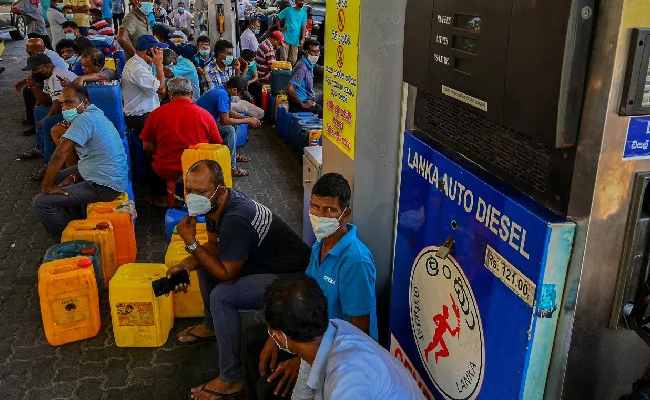Sri Lanka has suspended sales of fuel for non-essential vehicles as it faces its worst economic crisis in decades.
For the next two weeks only buses, trains, and vehicles used for medical services and transporting food will be allowed to fill up with fuel.
Schools in urban areas have shut and officials have told the country’s 22 million residents to work from home.
The South Asian nation is in talks over a bailout deal as it struggles to pay for imports such as fuel and food.
On Monday, the government said it will ban private vehicles from buying petrol and diesel until 10 July.
Bandula Gunewardena, a spokesperson for Sri Lanka’s cabinet, said Sri Lanka “has never faced such a severe economic crisis in its history”.
The cash-strapped country has also sent officials to the major energy producers Russia and Qatar in a bid to secure cheap oil supplies.
Sri Lanka’s economy has been hit hard by the pandemic, rising energy prices, and populist tax cuts.
Without enough foreign currencies to pay for imports of essential goods, an acute shortage of food, fuel and medicines has helped to push the cost of living to record highs.
Over the weekend, officials said the country had only 9,000 tonnes of diesel and 6,000 tonnes of petrol to fuel essential services in the coming days.
It has been estimated that the stocks would last for less than a week, under regular demand.
“We are doing everything we can to get new stocks but we don’t know when that will be,” power and energy minister Kanchana Wijesekera told reporters on Sunday.
Alex Holmes, a senior economist at Oxford Economics, told the BBC the fuel restrictions were “yet another small sign of a worsening crisis”.
“Mobility appears to have already been severely limited given that people were waiting in [long] queues for fuel. But the complete ban for private vehicles goes one step further, and will compound the economic pain,” he added.
In May, the country defaulted on its debts with international lenders for the first time in its history.
Last week, a team from the International Monetary Fund arrived in Sri Lanka for talks over a $3bn (£2.4bn) bailout deal.
The government is also seeking assistance from India and China to import essential items.
Prime Minister Ranil Wickremesinghe said earlier this month that the country needed at least $5bn over the next six months to pay for essential goods such as food, fuel and fertiliser.
In recent weeks, the government has also called on farmers to grow more rice and given government officials an extra day off a week to grow food, amid fears of a shortage.




